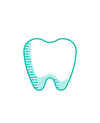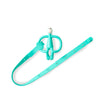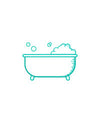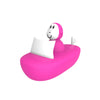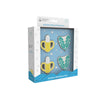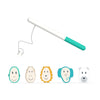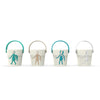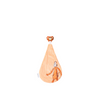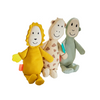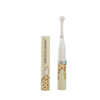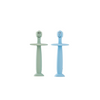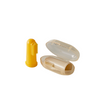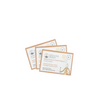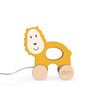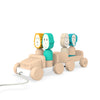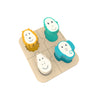All Your Teething Questions Answered by Leading Dentist, Dr Konviser
We thought it would be great to get all of the popular questions that you guys ask us answered by a professional dentist. After all, there’s so much information out there on teething, we wanted to make sure you got the best advice possible!
Dr Saul Konviser is a general dentist working at Dawood & Tanner General Dental Practice in Central London. He also is a Trustee of the charity, Dental Wellness Trust, providing oral health education workshops and toothbrushing programmes to schools across South East England as well as in Cape Town, South Africa.
What age would you expect teething to start?
Most children will start teething around the age of 6 months old but don't be worried if it's later. There is a real range for children and so it's quite normal for one child to get their first tooth at 6 months and another at maybe 10 months or even later, just be patient.
If you do have concerns however, please just visit your Dentist and ask them to have a look and feel of your child's gums.
When would you expect your child to have all their teeth? How many teeth should you child get in total?
The majority of children will have all 20 of their baby teeth by the age of two and a half, however, there are instances where there may be a delay with no teeth erupting, and then all of a sudden it feels like they all appear at the same time.
Also, there are some instances and conditions whereby children can be missing certain teeth so gaps may be present. It is important to also be aware that not all of the teeth grow sequentially one behind the other, there is a specific order that both child and adult teeth erupt so don’t worry if there are gaps.
Again, if you have any concerns, please take your child to see their dentist to find out more.

What is the best pain relief for teething?
There is no 'magic cure' for teething and each child differs. It can be extremely stressful and upsetting for both child and parent alike during the teething process and the important thing is to try and make your child as comfortable as possible.
Using regular medication such as Calpol or Neurofen in the recommended doses (assuming there are no contraindications especially to Neurofen) is very helpful. There are other alternative homeopathic remedies that some parents find helpful but this is a personal preference.
Providing a cold pack in a variety of forms is also very helpful to help the child chew and suck on and provide some short-term relief to the gums. There are also certain gels which include anaesthetic that can be placed over the gums and help provide some temporary relief. This is especially useful prior to bedtime to help kids fall asleep with no pain.
It is very important to keep the gums around the new teeth clean as they can get quite inflamed as the teeth cut through and so painful for the child. Using some gauze in salt water to cleanse the area or a teething toy such as the Matchstick Monkey with a teething gel is useful as it also helps to introduce the child to a toothbrush in a fun way.
Do children get any other side effects when teething?
It is quite common during teething for children to suffer from excessive saliva production and it looks like they are drooling all the time. This can also result in sores around the mouth if it is not kept clean, especially on their chin where the saliva can dribble and irritate.
Cheeks often become very red and the child can also have a very runny tummy. There are instances where kids could get a high temperature and again this should be managed with the appropriate medication and if necessary, always consult your GP.

Would you recommend using a baby brush for children to massage their gums from a young age even with no teeth? If so, why?
It is important for children to get used to brushing their teeth from the moment that first tooth pops out!
Does putting pressure on your gums help ease teething pain?
Yes, so a fun and child friendly teether like the Matchstick Monkey is a good way to start this habit from an early age and help them progress onto a normal toothbrush. It also has the added bonus of being soft enough for the children to chew on and help massage the gums during the eruption process.

Can you take vitamins to help with healthy teeth?
Children should always be given a healthy and well balanced diet with plenty of fruit and vegetables as these will all contain the necessary nutrients required for healthy growth and development. Apart from milk, they only need water to drink and should avoid sugary drinks and snacks unless it is for a special treat.
It is also crucial that an age appropriate Fluoride based toothpaste is used when brushing their teeth. For children under 3 years old, you only need a small smear of toothpaste on the brush and as they get older, try to teach them to spit it out rather than rinse the toothpaste off.
You should try to take your child to see the Dentist from when the first tooth comes out so that you can discuss their oral health and how best to help look after them.
Should you have any further questions, you can contact Dr Konviser at the details below:
Telephone: 020 7935 3016
Email: saulkonviser@dawoodandtanner47.co.uk
Website: www.dawoodandtanner.co.uk
Address
Dr Saul Konviser BDS MSc BSc
Dawood and Tanner General Dental Practice
47 Montagu Mansions, Marylebone, London W1U 6LD

